

Lawmakers Urge FTC to Investigate Google Buzz. Lawmakers Urge FTC to Investigate Google Buzz Ten House Members have asked the Federal Trade Commission to pursue an investigation into the Google social networking service Buzz, given "Google's practice of automatically using consumers' e-mail address books to create contact lists for Buzz and then publicly disclosing the names of those private contacts" online.

The lawmakers also asked the Commission to consider the privacy implications of Google's proposed acquisition of AdMob, the mobile phone advertising company. EPIC has filed a complaint with the FTC, asking the Commission to investigate Google Buzz. Previously, EPIC recommended that the FTC block Google's acquisition of Doubleclick, the banner advertising firm, because of the privacy implications.
For more information, see EPIC: In re Google Buzz. Inside the U.S. Antitrust Probe of Google. FTC: Google search bias is a part of innovation. Has Google altered its algorithm to favor its own properties in vertical search results?
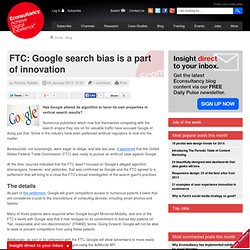
Numerous publishers which now find themselves competing with the search engine they rely on for valuable traffic have accused Google of doing just that. Some in the industry have even petitioned antitrust regulators to look into the matter. Bureaucrats, not surprisingly, were eager to oblige, and late last year, it appeared that the United States Federal Trade Commission (FTC) was ready to pursue an antitrust case against Google.
Google's FTC Settlement Is An Epic Fail For Microsoft. Microsoft had a pretty lousy year in 2012, putting out a string of big products – Windows 8, Windows Phone 8 and the Surface tablet – that all turned out to be be disappointing.
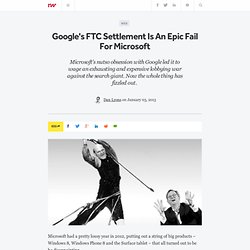
But those pale in comparison to what may be the biggest disappointment in Microsoft’s history — its failure to convince antitrust regulators to take action against Google. After a 19-month investigation and despite much prodding from Microsoft, the Federal Trade Commission has reached a settlement with Google that basically amounts to a slap on the wrist. This is a crushing blow to Microsoft, which has spent millions of dollars on lobbyists and phony grassroots groups over the past several years hoping to land Google in hot water. Indeed, Microsoft’s obsession with Google doesn’t just border on crazy.
It is crazy, and not just a little tiny bit crazy but full-blown, bunny-boiling, Ahab-versus-the-whale nutso. Who won, who lost in Google-FTC deal. Google CEO Larry Page has reason to smile on Thursday now that the threat of an FTC antitrust lawsuit has been averted.
As the dust settled on the Federal Trade Commission probe of Google on Thursday, the search giant appears to be the biggest winner and rival Microsoft the biggest loser. The deal lets Google's search practices remain virtually unchanged despite loud cries from Bing's creators in Redmond, Wash., over anti-competitive bias in the way its products show up on Google searches. The FTC pointedly made reference to a quote for late Supreme Court Justice Earl Warren that U.S. antitrust laws are meant to protect competition, not competitors. All's fair in love and search wars, the FTC said, in effect. Other winners in the agreement include companies like Yelp that run shopping, travel and local sites.
These websites could already opt out of Google Search, but that hurt their Web traffic. Cromwell Schubarth is the Senior Technology Reporter at the Business Journal. Google's win with FTC not likely to impact Microsoft/Motorola trial. The FTC explains why it will force Google to license its "standard-essential patents" in this infographic.
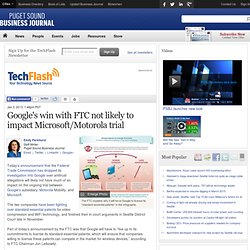
Today’s announcement that the Federal Trade Commission has dropped its investigation into Google over antitrust allegations will likely not have much of an impact on the ongoing trial between Google’s subsidiary, Motorola Mobility, and Microsoft. The two companies have been fighting over standard-essential patents for video compression and WiFi technology, and finished their in-court arguments in Seattle District Court late in November.
L’accord entre Google et la FTC suscite critiques et inquiétudes [MàJ] 01net. le 04/01/13 à 15h37 La Commission européenne ne tiendra pas compte de la décision de la FTC Alors que l’autorité de régulation de la concurrence américaine, la FTC, a blanchi Google au terme de son enquête, la Commission européenne a fait savoir, par le biais de son porte-parole Michael Jennings, que « nous avons pris note de la décision de la FTC mais que cela n’aura pas d’implication directe pour notre enquête, pour les discussions avec Google, qui se poursuivent. »
![L’accord entre Google et la FTC suscite critiques et inquiétudes [MàJ]](http://cdn.pearltrees.com/s/pic/th/suscite-critiques-inquietudes-83660495)
Google emerges from FTC antitrust investigation practically unscathed. After 20 months the Federal Trade Commission (FTC) has ruled that its antitrust investigation into Google can be closed, with the search giant volunteering to make some minor changes.
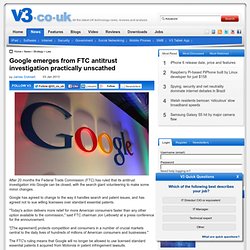
Google has agreed to change to the way it handles search and patent issues, and has agreed not to sue willing licensees over standard essential patents. "Today's action delivers more relief for more American consumers faster than any other option available to the commission," said FTC chairman Jon Leibowitz at a press conference for the announcement. "[The agreement] protects competition and consumers in a number of crucial markets central to the daily lives of hundreds of millions of American consumers and businesses. " FTC Slaps Google's Wrist in Search, Patent Probe. FTC Chairman Jon Leibowitz said Thursday that Google search did not breach antitrust rules.
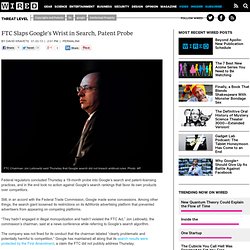
Photo: AP Federal regulators concluded Thursday a 19-month probe into Google’s search and patent-licensing practices, and in the end took no action against Google’s search rankings that favor its own products over competitors. Still, in an accord with the Federal Trade Commission, Google made some concessions. Among other things, the search giant loosened its restrictions on its AdWords advertising platform that prevented advertisers from appearing on competing platforms. “They hadn’t engaged in illegal monopolization and hadn’t violated the FTC Act,” Jon Leibowitz, the commission’s chairman, said at a news conference while referring to Google’s search algorithm.
The company was not fined for its conduct that the chairman labeled “clearly problematic and potentially harmful to competition.” 130103googleleibowitzremarks. "FTC Ends Google Investigation With a ‘Slap on the Wrist’" Google Settles FTC Antitrust Probe: Will Let Competitors Remove Content From Google Search, Make Ad Campaign Exports Easier. As expected, the Federal Trade Commission’s Chairman Jon Leibowitz just announced at a press conference in Washington, D.C., that the agency has settled with Google to resolve the 20-month antitrust probe into the company’s alleged anticompetitive behavior.
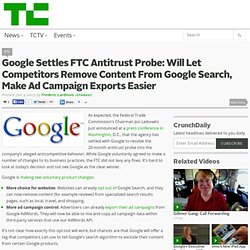
While Google voluntarily agreed to make a number of changes to its business practices, the FTC did not levy any fines. It’s hard to look at today’s decision and not see Google as the clear winner. Google is making two voluntary product changes: More choice for websites: Websites can already opt out of Google Search, and they can now remove content (for example reviews) from specialized search results pages, such as local, travel, and shopping.More ad campaign control: Advertisers can already export their ad campaigns from Google AdWords. They will now be able to mix and copy ad campaign data within third-party services that use our AdWords API. Company Cleared on Search Bias Claims - Liz Gannes.
Google won’t have to significantly change the way it does business as a result of a two-year antitrust investigation by the U.S.
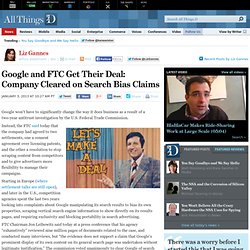
Federal Trade Commission. Instead, the FTC said today that the company had agreed to two settlements, one a consent agreement over licensing patents, and the other a resolution to stop scraping content from competitors and to give advertisers more flexibility to manage their campaigns. Starting in Europe (where settlement talks are still open), and later in the U.S., competition agencies spent the last two years looking into complaints about Google manipulating its search results to bias its own properties, scraping vertical search engine information to show directly on its results pages, and requiring exclusivity and blocking portability in search advertising.
Google settles with FTC over antitrust issues. FTC to announce outcome of Google antitrust probe. WASHINGTON (AP) — Google is agreeing to license certain patents to mobile phone rivals and stop a practice of including snippets from other websites in its search results as part of a settlement to end a 19-month investigation into the search leader's business practices, the Federal Trade Commission said Thursday. U.S. antitrust regulators added that they have found no evidence to claims that Google unfairly favors its own services in search results.
Google did agree to license patents deemed to be "essential" for rival mobile devices such as Apple Inc.'s iPhone, Research in Motion Ltd.'s BlackBerry and smartphones running on a Microsoft Corp.'s Windows software. Regulators say Google is also promising that upon request, it will exclude snippets copied from other websites in its summaries of key information, even though the company had insisted the practice is legal under the fair-use provisions of U.S. copyright law. Google Agrees to Change Its Business Practices to Resolve FTC Competition Concerns In the Markets for Devices Like Smart Phones, Games and Tablets, and in Online Search. Google Inc. has agreed to change some of its business practices to resolve Federal Trade Commission concerns that those practices could stifle competition in the markets for popular devices such as smart phones, tablets and gaming consoles, as well as the market for online search advertising.
Under a settlement reached with the FTC, Google will meet its prior commitments to allow competitors access – on fair, reasonable, and non-discriminatory terms – to patents on critical standardized technologies needed to make popular devices such as smart phones, laptop and tablet computers, and gaming consoles. “The changes Google has agreed to make will ensure that consumers continue to reap the benefits of competition in the online marketplace and in the market for innovative wireless devices they enjoy,” said FTC Chairman Jon Leibowitz. “This was an incredibly thorough and careful investigation by the Commission, and the outcome is a strong and enforceable set of agreements.” Live_Webcast. The FTC Smartly Ends Its Imprudent Google Search Antitrust Investigation.